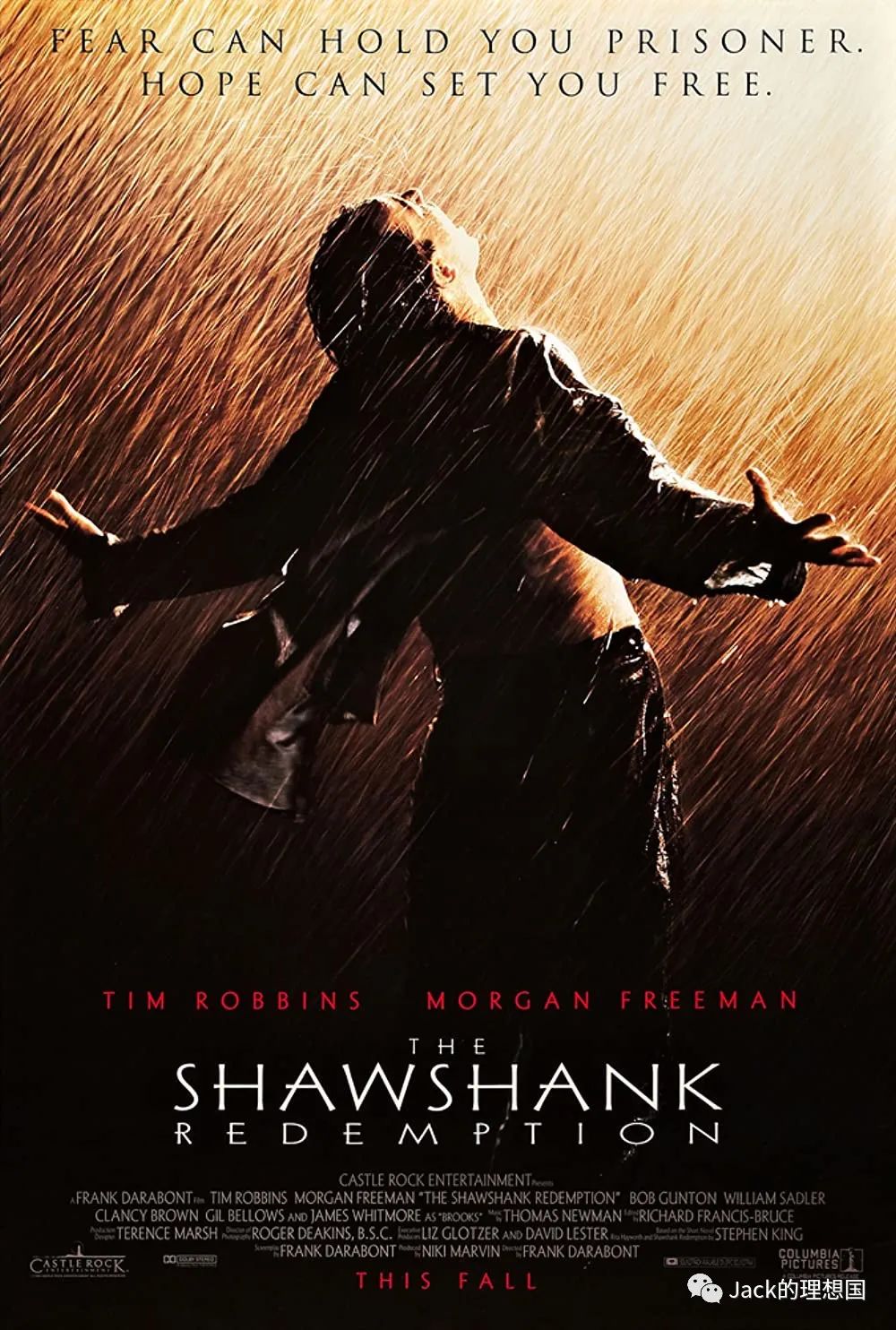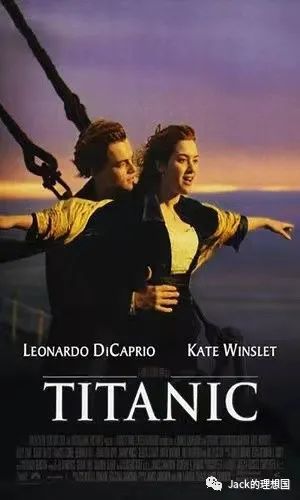On Mental Freedom 论精神自由


What is the power of freedom? What can freedom bring? What can freedom surpass? These questions are discussed in detail and depth in two of the most classic films ever, The Shawshank Redemption and The Titanic. Based on the evidence from these two films, this essay will look at the power and capabilities of freedom, then explore the growth of freedom, and expound on the general relationship between love and freedom.
Defining Mental Freedom:
Before further explanation and analysis set in, it is necessary to define the freedom that is mainly discussed in The Shawshank Redemption and The Titanic – mental or spiritual freedom. Mental freedom can be roughly defined as the ability to detach from outside factors and to primarily focus on the will of one’s heart or mentality. While most people in the current world have or can attain physical freedom, that is freedom without any physical captivity, few possess or manage to seek mental freedom successfully.
In both films, the protagonists are either born with or procure mental freedom. In The Shawshank Redemption, Andy Dufresne possesses mental freedom, even though his physical freedom is taken away. His heart always transcends boundaries and is fixed intently on his goals. Andy’s freedom also shields him from reality's pain and tedious agonies. Similarly, though in prison for decades, Andy's friend Red eventually grows, obtaining his mental freedom. Like Andy, in the end, his spirit transcends the physical and mental barriers set by the prison environment, and can provide his life with vitality or meaning. In The Titanic, Jack owns his spiritual freedom, which supplies him with optimism and passion. He can pursue his dreams and live harmoniously with fate. By being inspired by Jack and seeking inwards, Rose finds the spiritual freedom that breaks all the kinds of imprisonment being forced on her.
The Power of Mental Freedom:
The power of freedom first breaks all physical boundaries. In The Shawshank Redemption, the prison bars cannot prevent Andy from following his heart and living in a mentally free state. Although bound by physical constraints, his mind still flies. One of the most heartwarming moments of the film comes when Andy plays “Le Nozze di Figaro,” a classical, renowned piece by Mozart, to the entire prison, knowing that doing so is strictly against the rules. Despite being well aware that he is physically constrained, his mental freedom still enables him to enjoy classical music. Another moving section of the plot is when Andy writes 312 letters persistently over five years, eventually persuading the state to donate a library to the prison. What is the motivation behind five years of sheer perseverance? It is, again, his mental freedom. Andy believes in the power of books to sustain the spiritual life of the mind. Finally, 19 long years is the time Andy spends digging a tunnel through the prison walls with a small hammer that leads to his physical freedom. This tunnel also symbolizes that his mind is never imprisoned by Shawshank.
Social hierarchy is another type of physical boundary, though not as evident in the modern world as in the past. Especially in the early 20th century, social class was a boundary that physically separated the powerful and the powerless, the rich and the poor. However, just like how mental freedom can surpass the restraints of prison bars, mental freedom also is capable of surpassing the constraints of social classes at times. In The Titanic, Jack, a third-class passenger who does not own a penny, manages to surmount the obstacles of social hierarchy and pursue his genuine love for Rose. There is much evidence in the film that suggests this point. During the dinner with Rose, he never feels the slightest awkwardness or discomfort with the rich and the powerful. He seems ignorant about the hierarchies between him and Rose that separate them, travelling between the two worlds with relative ease. What gives him the ability to disregard all the hurdles? It is his mental freedom.
On the second level, mental freedom can break the shackles of wealth, fame, and a life of ease, generally considered more unbreakable than physical boundaries, as they stick to inner human nature more closely.
In The Shawshank Redemption, Andy is the private assistant to the prison's warden. By being in this position, Andy gets many perks that other inmates do not have, such as having the protection of the police officers and also at times, consuming alcohol. However, this relatively easy and stable lifestyle does not hold Andy down. In his position, driven by his fierce desire for freedom, Andy still constantly plans the escape meticulously. He hides the hammer in The Bible, and he secretly keeps track of all the money he washes for the warden so that he can tactfully use them after the escape. It is remarkable how Andy, by possessing such passionate spiritual freedom, successfully clears his mind of the thoughts of living out this easier, stabler life in prison, focusing solely on the ultimate goals.
In The Titanic, it is more incredible what the power of mental freedom can achieve. Besides having stark differences in social status, Jack and Rose also have huge gaps between their respective wealth or fame. Typically, for a poor person, it is improbable that they can set their heart free and chase after a love that spans rifts in affluence or reputation. Yet Jack, who owns a free spirit, is more than capable of pursuing his true love. Throughout the relationship, Jack is unbothered by his poverty or low reputation and views himself as equal with Rose, one of the prerequisites for romance to occur. He learns to appreciate Rose’s life and draws Rose in to understand his lifestyle and personal philosophies. There is seamless communication between the two characters that is initially powered by his mental freedom.
Ultimately, no matter the social rank, affluence, or fame a person has, they still have to face life and death decisions perhaps several times throughout their lives. This situation applies to the same with Andy and Jack in both films. Both of the characters have to deal with the tests set by the Grim Reaper. And both look the Grim Reaper in the eye with no fear, for they have mental freedom.
In The Shawshank Redemption, Andy faces the potential gamble of life and death each day. Besides the brutal prison police, he also needs to survive the constant harassment from the three sisters and other inmates. In such a rough or harsh environment, Andy does not back down from all the threats. What provides him with this capacity to keep pursuing his goals of survival, escape, and bringing other inmates the smell of freedom is his mental freedom. His mind manages not to heed the danger of death itself, calm him down in perilous situations, and keep the vitality and determination going.
In The Titanic, Jack’s mental freedom proves that he does not fear death. Towards the end of the film, when it is apparent that a great tragedy will occur with the ship, Jack’s mental freedom feeds him with unbelievable courage and audacity to show romantic love in the purest and most dramatic sense. At that moment, though fears might fill his mind, he can put them aside and focus solely on his free quests for ultimate love and freedom. This capability of Jack is what constitutes the final moving minutes of the film and what makes his love with Rose eternal.
Overall, as elaborated in the previous paragraphs, spiritual freedom can break physical boundaries, the shackles of wealth or fame, and even the fear of death. It makes a person detach from the agonies or issues of the real world and bend all will on the goals and meanings of their life.
The Growth of Mental Freedom
Are all people born with mental freedom, or are they born without mental freedom, or can they eventually procure it through exploration? While some people’s minds do seem to enjoy more freedom, mental freedom develops with fresh growth and understanding in life. However, to obtain mental freedom more thoroughly, one’s mind must plant the seeds for it. And whether one possesses the seeds or not is more related to whether one has a born personality that longs for exploration, for struggling out of confinements, and whether one has, if not this born personality, a mind that processes the information of the world in creative ways.
In The Shawshank Redemption, one pertinent case to illustrate the point above is Andy’s best friend in prison, Red. Red’s growth throughout the film is substantial. Before meeting Andy and befriending him, Red is different from the other inmates in some respects. He seems to be bothered less about prison life and is more connected with the world outside the bars. This difference is the seeds for the growth Red would experience upon getting to know Andy. But in the previous years, without the presence of Andy, Red does not feel so drawn by mental freedom. He does not pursue his goals of potentially getting out of Shawshank with much ardency, failing several times in the court. Nor does he decide, in any way, to enrich his mental life, to make his mind possess the ability to fly out of the prison containments with ease.
Andy helps Red to grow his mental freedom. He helps in various ways. First, Andy demonstrates directly to Red what a free mind can achieve, even in a gloomy place like a prison. With his efforts, Andy manages to get Red and his friends a job that would earn them frozen beer. He shows Red, by playing “Le Nozze di Figaro,” the power of music. By creating a library and persuading Red to join the cause, he lets Red experience the beauty of knowledge and the ultimate creations of human intelligence. All these actions and events evoke the inner human nature of Red to think beyond the life in Shawshank, to think of goals that would truly bring happiness.
Second, through his conversations with Red, Andy encourages Red to seek mental freedom. In one exchange, he tells Red, “That’s the one thing they can’t confiscate, not ever. That’s the beauty of it. Haven’t you ever felt that way about music, Red?” In another conversation, Andy tells Red, “That’s where I want to live the rest of my life – a warm place with no memory.” Through discussions like this, Andy draws a picture for Red of what a life with mental freedom looks like and pushes Red to seek it himself. Red gradually realizes that he can follow the path leading to spiritual freedom and that it is necessary for sustenance on the mental level. In the eventual parole hearing at court, Red demonstrates this growth of mind to appreciate the beauties of human nature and put aside the trivial problems of reality. He touches the hearts of the judges and finally regains his physical freedom.
In The Titanic, It is also possible to argue that Jack helps the growth of mental freedom in Rose. Rose possesses a heart that yearns to fly out of the cage, and it has the seed of freedom. Yet she fails in letting out her imprisoned heart. Things change, though, when Jack appears in the scene. Like Andy, he shows Rose what a spiritually free life looks like and what one can achieve by being spiritually free. He takes Rose down to the third class to experience the real party; he holds Rose at the tip of the ship, feeling the rhythm of the ocean and the wind; he liberates Rose of the shackles put on her by her social hierarchy and people around. Ultimately, Rose’s mind gains the ability to detach from all outside factors and focus on what life her heart truly wants to live. One should not simply understand that it is all Jack’s accomplishments that Rose metamorphosizes into a free being. Jack merely acts as the guide or torch that lights up the flame. Without Rose innately being drawn to live mentally unchained, it would have been significantly more improbable for Jack to fuel growth in Rose. The changes in this character from a young woman kept on leash to a passionate soul whose mind wanders as far as the ocean stretches illustrate again the point: mental freedom can be developed or kindled, but one must first have the seeds of this kind of freedom planted.
The Marriage of Love and Freedom
Finally, one theme that both films try to display is that love and freedom are closely bonded and that without each other, both would break down. By love, one should not comprehend it as arbitrarily or unilaterally as romantic love. Instead, love can be towards many elements in life; it generally describes a surge of emotion constantly towards something.
In The Shawshank Redemption, love and freedom are intertwined in direct ways. Andy possesses strong mental freedom. As a result, even in a dim prison environment, he can pursue his love for music, his love for knowledge, and his love for a simple yet free life. Without mental freedom, Andy cannot persuade his heart to continue pursuing the love he has for so many elements of life because his mind is firmly imprisoned. Another case in point that shows that love would disappear without mental freedom is the old Brooks. After more than 60 years in Shawshank, he is set free by the court at a very old age. Though regaining his physical freedom, Brooks’ mind was still chained by his experience in Shawshank. He cannot set his mind or spirit free to explore the new world surrounding him and thus can no longer find his love for life. Brooks commits suicide in the end.
On the other way of the relationship, love can plant the seeds on which mental freedom grows. The logic is simple. If one feels love for something, this passion should likely leave a mark in that person’s mind. Outside shackles can bury this mark, but they cannot eradicate it. This mark will drive one to fulfill that love despite the obstruction of outside forces. In The Shawshank Redemption, Red’s curiosity or love for a potential life out of the prison cells marks his heart and plants the seeds of mental liberty. Consequently, when Andy aids Red to re-discover this passion, this flame is rekindled, and Red eventually obtains both physical and mental freedom.
In The Titanic, love, pure love, and freedom are entangled in similar ways. Love fuels Jack and Rose's chase and realization of mental freedom. For Jack, his love for Rose totally unleashes his spirit, giving him the power to disregard social status, wealth, fame, and even life and death. For Rose, her love for Jack, in the end, urges her to realize the momentum of mental freedom within her and disregard factors holding her back.
The Titanic additionally points out how freedom feeds back to love. Once Jack and Rose free their spirits, their love for each other and the lives they are leading only become stabler and stronger. The freezing water cannot even cool down their fervent love by the end of the film. This positive feedback loop happens because mental freedom allows one to appreciate the beauties of another person or life in general and to transcend the agonies of reality preventing them from doing so, even death. Freedom sends love to a more sublime state.
Final Words
What is the power of freedom? What can freedom enable a soul to do? What can freedom surpass? By looking at The Shawshank Redemption and The Titanic, it is impossible not to gasp and feel the power of mental freedom. By attaining it, one would not only clear their paths to accomplish goals and find meaning or value, but one would also feel the exhilaration of exploring fresh dimensions of life.
This essay shall end by tying freedom to hope, as both films do. With the raging pandemic, the Russian-Ukraine conflict, and other spiny issues still plaguing the world today, hope is still very much needed, and freedom. Without freedom, hope cannot be solid or real; without hope, what constitutes the beauty of freedom? So many people fail even to begin the search or realization for mental freedom, and hence few have much hope for the future humankind is heading into. This thought is both chilling and dangerous. The notion that people fail to start reaching for mental freedom means that many individuals are not exploring themselves to search for intrinsic value and instead rely on the volatility of fate or the virtual world. If this trend continues, then we are on a path of de-evolving, depriving ourselves of the proud creations of the human mind.
Red closes the film by saying, “I think that’s the excitement only a free man can feel, a free man at the start of a long journey whose conclusion is uncertain. I hope I can make it across the border. I hope to see my friend and shake his hand. I hope the Pacific is as blue as it has been in my dreams. I hope.” Everyone should start their spiritual journeys, be it long or short, and hope that the world that we live in is on the right course as it was when our predecessors first began the exploration of mental freedom.
PICTURES CITED
https://www.diamondpaintingclearance.com/titanic-poster-painting-kit
https://www.imdb.com/title/tt0111161/
自由的力量是什么?自由能为一个灵魂带来什么?自由能超越什么?在有史以来最经典的两部电影《肖申克的救赎》和《泰坦尼克号》中,这些问题得到了详细而深入的讨论。基于这两部电影的证据,本文将探讨自由的力量和能力,然后探讨自由的成长,并整体阐述爱和自由之间的关系。
精神自由的定义
在进一步解释和分析之前,有必要首先定义《肖申克的救赎》和《泰坦尼克号》中主要讨论的那种自由--心灵或精神自由。精神自由可以粗略地定义为脱离外部因素影响的能力,并主要关注自己的内心或心态的意愿。虽然现今世界上大多数人都拥有或能够达到身体上的自由,也就是没有任何身体上被囚禁的自由,但真正拥有或能够成功寻求精神自由的人很少。
在这两部电影中,主人公要么生来就有,要么后天逐渐获得了精神自由。在《肖申克的救赎》中,主人公安迪-杜夫雷恩拥有精神自由,尽管他的身体自由被剥夺了。他的心总是超越界限,并专注于他的目标。安迪的自由也使他免受现实的痛苦和乏味的折磨。同样,安迪的好朋友瑞德虽然在监狱里呆了几十年,但最终成长起来,获得了精神自由。像安迪一样,最后,他的精神超越了监狱环境设置的身体和精神障碍,能够为他的生活提供活力或意义。在《泰坦尼克号》中,杰克拥有自己的精神自由,这为他提供了乐观和激情。他可以追求自己的梦想,并与命运和谐相处。罗丝在杰克的激励下,通过向内寻求,找到了她的精神自由,打破了强加在她身上的各种禁锢。
精神自由的力量
自由的力量首先打破了所有的物理界限。在《肖申克的救赎》中,监狱的栅栏无法阻止安迪追随他的内心,生活在精神上的自由状态中。尽管受到身体的束缚,他的思想仍然在飞翔。影片中最感人的时刻之一是安迪向整个监狱播放莫扎特的经典《费加罗的婚礼》,虽然他知道这样做是严格违反规定的。是什么让他能够在严密的束缚之下仍然享受古典音乐?是他的精神自由。剧情的另一个动人部分是安迪五年来坚持不懈地写了312封信,最终说服国家向监狱捐赠了一个图书馆。五年纯粹的坚持背后的动机是什么?还是他的精神自由。安迪相信书籍的力量可以维持心灵的精神生活。最后,19年级的漫长岁月,安迪用一把小锤子在监狱的墙壁上凿开了一条通往身体自由的隧道,同时也意味着,在这19年的囚禁生涯中,他的思想和心灵从未被禁锢。
另一种类型的物理边界是社会等级制度,虽然在现代世界中不像过去那样明显。特别是在20世纪初,社会等级从根本上看是一个物理界限,从物理上将有权势的人和无权势的人,富人和穷人分开。然而,就像精神自由能够超越监狱铁窗的束缚一样,精神自由有时也能够超越社会等级的束缚。在《泰坦尼克号》中,杰克,一个一文不名的三等舱乘客,成功地克服了社会等级的障碍,追求他对罗丝的狂热的爱。片中有许多证据表明了这一点。在与罗丝的晚餐中,他从未对富人和权贵感到丝毫的尴尬或不自在。他似乎对他和罗丝之间隔着的等级制度一无所知,相对轻松地穿梭于两个世界之间。是什么让他有能力无视一路上的所有障碍?我想,是他的精神自由。
在第二个层面上,精神自由有能力打破财富、名利和安逸生活的枷锁,这些枷锁通常被认为比物理边界更牢不可破,因为它们更贴近人类的内在本质。在《肖申克的救赎》中,安迪是监狱典狱长的私人助理。在这个职位上,安迪得到了许多其他囚犯所没有的特权,比如有警察的保护,有时还可以喝酒。然而,这种相对轻松和稳定的生活方式并没有让安迪感到被抑制住。在他的位置上,在对自由的强烈渴望的驱使下,安迪仍然不断地精心策划越狱。他把锤子藏在《圣经》里,他秘密地记录下他为监狱长洗的所有钱,以便在逃跑后巧妙地使用它们。值得注意的是,安迪通过拥有如此热情纯粹的精神自由,成功地清除了他在监狱里过这种更轻松、更稳定的生活的想法与桎梏,只专注于人生的最终目标。
在《泰坦尼克号》中,精神自由的力量所能达到的效果更令人难以置信。杰克和罗丝除了在社会地位上有鲜明的差异外,在各自的财富或名声上也有巨大的差距。通常情况下,对于一个被贫穷所束缚的人来说,他们不可能让自己的心自由起来,去追寻一份跨越财富或名誉显著差距的爱情。然而,拥有自由精神的杰克却更有能力去追求他的真爱。在整个交往过程中,杰克完全不为自己的贫穷或低下的名声所困扰,他把自己和罗丝看成是平等的,这是浪漫发生的先决条件之一。他学会了欣赏罗丝的生活,并吸引罗丝来欣赏他的生活方式和他的个人哲学。两个人物之间有一种无缝的交流,这种交流开始是由杰克的精神自由提供的。
归根结底,无论一个人的社会地位、富裕程度或名气有多大,他们在一生中也许仍要多次面对生死的抉择。这种情况同样适用于两部影片中的安迪和杰克。这两个角色都必须应对死神设置的考验。不过,两人都选择直视死神的眼睛,毫无畏惧,因为他们拥有绝对的精神自由。
在《肖申克的救赎》中,安迪每天都面临着潜在的生死赌注。除了残酷的监狱警察,他还需要在三姐妹和其他囚犯的不断骚扰中生存。在这样一个粗糙或严酷的环境中,安迪在所有的威胁面前都没有退缩。是什么让他有能力继续追求他的生存、逃亡、给其他囚犯带来自由的味道的目标?是他自己的精神自由。他的头脑不理会死亡本身的危险,使他在危险的情况下冷静下来,并保持活力和决心。
在《泰坦尼克号》中,杰克的精神自由证明了他并不惧怕死亡。在影片的结尾处,当这艘船显然会发生巨大的悲剧时,杰克的精神自由为他提供了难以置信的勇气和胆量,在最纯粹和最戏剧化的意义上表现出浪漫的爱情。在那一刻,尽管他的头脑中可能充满了许多恐惧,但他有能力把它们放在一边,只关注他对终极爱情和自由的追求。杰克的这种能力构成了影片中令人感动的最后几分钟,也使他与罗丝的爱情成为永恒。
总的来说,正如前面几段所阐述的,精神自由有能力打破身体的界限、财富或名声的桎梏,甚至对死亡的恐惧。它使人从现实世界的痛苦或问题中脱离出来,把所有的意志都转向自己的人生目标和意义上。
精神自由的成长
是所有的人天生就有精神自由,还是所有的人天生就没有精神自由,还是最终能通过探索获得精神自由?虽然有些人的头脑似乎享有更多的自由,但精神自由是随着生活中新的成长和理解而发展的。为了更彻底地获得精神自由,一个人的思想必须为它播下种子。而一个人是否拥有这些种子,更多的是与一个人是否具有渴望探索、渴望挣脱束缚的天生个性有关,或者一个人是否具有以创造性方式处理世界信息的一颗头脑。
在《肖申克的救赎》中,一个可以说明上述观点的相关案例是安迪在监狱中最好的朋友瑞德。瑞德在整部影片中的成长是巨大的。在遇到安迪并与他结为朋友之前,瑞德已经在某些方面与其他囚犯不同。他似乎被监狱生活的困扰相对较少,而与铁窗外的世界联系更多。事实上,这种差异是瑞德在认识安迪后导致他经历成长的种子。但在没有安迪在场的前几十年,瑞德并没有感到被精神自由所吸引。他并不热衷于追求有可能离开肖申克的目标,在法庭上多次假释失败。他也没有决定以任何方式来丰富他的精神生活,使他的思想拥有轻松飞出监狱的能力。
安迪以多种方式帮助瑞德培养他的精神自由。首先,安迪直接向瑞德展示了一个自由的心灵可以实现什么,即使在监狱这样一个阴暗的地方。在他的努力下,安迪设法为瑞德和他的朋友们找了一份监狱工作,可以为他们赚取冷冻啤酒。他通过播放《费加罗的婚礼》,向瑞德展示了音乐的力量。通过创建图书馆并说服瑞德加入这一事业,他让瑞德体验到知识的魅力和人类智慧的终极创造。所有这些行为和事件都唤起了瑞德内在的人性,让他思考超越肖申克的生活,思考能真正带来幸福的目标。
第二,安迪通过与瑞德的谈话,鼓励瑞德寻求精神自由。在一次谈话中,他告诉瑞德:"[音乐]是他们无法没收的东西,永远也不可能。这就是它的美妙之处。你对音乐没有过这种感觉吗,瑞德?" 在另一次谈话中,安迪告诉瑞德,"这就是我想在我的余生中生活的地方--一个没有记忆的温暖地方。”通过这样的对话,安迪为瑞德描绘了一幅拥有精神自由的生活图景,并推动瑞德自己去寻找。瑞德逐渐意识到,他有能力沿着通往精神自由的道路前进,而且这对精神层面的寄托是必要的。在最终的法庭假释听证会上,瑞德展示了这种心灵的成长,这种能够欣赏人性的美好、抛开现实的琐碎问题的成长。他打动了法官的心,并最终恢复了肉体的自由。
在《泰坦尼克号》中,可以说,杰克帮助罗丝实现了精神自由的成长。罗丝拥有一颗渴望飞出牢笼的心,它有自由的种子。然而,她并没有成功放出她被禁锢的心。不过,当杰克出现时,情况发生了变化。像安迪一样,他向罗丝展示了精神自由的生活是什么样子,以及一个人通过精神自由可以达到什么。他把罗丝带到三等舱,体验真正的宴会;他把罗丝抱在船头,感受海洋和风的节奏;他把罗丝从社会等级制度和周围人给她戴的枷锁中解放出来。最终,罗丝的心灵获得了脱离一切外界因素的能力,并专注于她内心真正想要的生活。人们不应简单地理解,罗丝蜕变成一个自由的人完全是杰克的功劳。杰克只是充当了引导者或点燃火焰的火炬。如果罗丝没有天生被精神上不受束缚的生活所吸引,杰克要推动罗丝的成长也就会明显变得更不可能。这个人物从一个被“拴住”的年轻女人变成了一个充满激情的灵魂,她的思想像大海一样悠远,这再次说明了一个问题:精神自由是可以发展或点燃的,但一个人必须在自己的心灵中先种下这种自由的种子。
爱与自由的联姻
最后,两部电影都试图展示的一个主题是,爱和自由是紧密相连的,没有对方,两者都会崩溃。对于爱,人们不应该像理解浪漫的爱情那样任意或单方面地理解它。爱可以面向生活中的许多元素,它通常描述的是对某一事物不断涌动的情感。
在《肖申克的救赎》中,爱和自由以直接的方式交织在一起。安迪拥有强烈的精神自由。因此,即使在昏暗的监狱环境中,他也能追求他对音乐的热爱,对知识的热爱,以及对简单而自由的生活的热爱。如果没有精神上的自由,安迪就无法说服自己的心继续追求他对生活中这么多元素的爱,因为他的思想被牢牢禁锢住了。另一个说明没有精神自由,爱就会消失的案例是老布鲁克斯。在肖申克监狱呆了60多年后,他在很老的时候被法庭释放了。虽然恢复了身体的自由,但布鲁克斯的思想仍然被他在肖申克的经历所束缚。他无法让自己的思想和精神自由地去探索周围的新世界,因而无法再找到自己对生活的热爱。布鲁克斯最后选择了自杀。
在这一关系的另一面,爱可以播下精神自由成长的种子。这个逻辑很简单。如果一个人感受过爱,那么这种感受很可能会在这个人的脑海中留下一个印记。这个印记可以被外界的桎梏所埋没,但它不能被完全摧毁。它会一直驱使一个人去实现这种爱,尽管有外界力量的阻挠。在《肖申克的救赎》中,瑞德对走出监狱牢房的潜在生活的好奇心或热爱,在他的心中留下了印记,为自己的精神自由埋下了种子。因此,当安迪帮助瑞德重新找到这种激情时,这个火种被点燃,瑞德最终获得了身体与精神的双重自由。
在《泰坦尼克号》中,爱,更确切地说,是纯粹的爱,和自由以类似的方式纠缠在一起。爱情助长了杰克和罗丝对精神自由的追逐和实现。对杰克来说,他对罗丝的爱完全释放了他的精神,为他提供了无视社会地位、财富名声,甚至生与死的力量。对罗丝来说,她对杰克的爱,最终促使她实现了她内心的精神自由的动力,也让她无视那些一直阻碍她的因素。
《泰坦尼克号》还指出了自由是如何反馈给爱情的。一旦杰克和罗丝都释放了自己的精神,他们对彼此的爱和他们所过的生活,只会变得更加稳定和强大。在影片结束时,冰冷的水甚至无法冷却他们热切的爱。这种积极的反馈循环之所以发生,是因为精神上的自由使人能够欣赏另一个人或整个生活的美,并超越阻碍他们这样做的现实的痛苦,甚至死亡。自由将爱送入更崇高的境界。
最后的话
自由的力量是什么?自由能为一个灵魂带来什么?自由能超越什么?通过看《肖申克的救赎》和《泰坦尼克号》,我们能够强烈感受到精神自由的力量。通过获得自由,人们不仅可以扫清他们完成目标的道路,找到意义或价值,而且还可以感受到探索生命新维度的冲击感。
本文最后将把自由与希望联系起来,正如两部电影所做的那样。疫情、俄乌冲突以及其他棘手的问题仍然困扰着当今世界,人们仍然非常需要希望与自由。没有自由,希望就不可能稳固或真实;没有希望,自由之美又是由什么构成的呢?许多人甚至没有开始寻找或实现精神自由,因此很少有人对人类正在走向的未来抱有希望。这种想法既让人不寒而栗,也很危险。人们未能开始接触精神自由的概念意味着许多人没有探索自己以寻找内在价值,而是依赖命运的波动或虚拟世界。如果这种趋势继续下去,那么我们就走上了一条反进化的道路,其剥夺了人类思想的骄傲创造。
瑞德在影片结束时说:"我想这是只有自由人才能感受到的兴奋,一个自由人在漫长旅程的起点上,其结论是不确定的。我希望我能够越过边界。我希望能见到我的朋友并与他握手。我希望太平洋就像我梦中那样蓝。我希望。”每个人都应该开始他们的精神之旅,不管是漫长还是短暂,同时希望我们生活的世界就像我们的前辈最初开始探索精神自由时一样,始终在正确的道路上发展。
- 本文标签: 原创
- 本文链接: http://www.jack-utopia.cn//article/404
- 版权声明: 本文由Jack原创发布,转载请遵循《署名-非商业性使用-相同方式共享 4.0 国际 (CC BY-NC-SA 4.0)》许可协议授权










